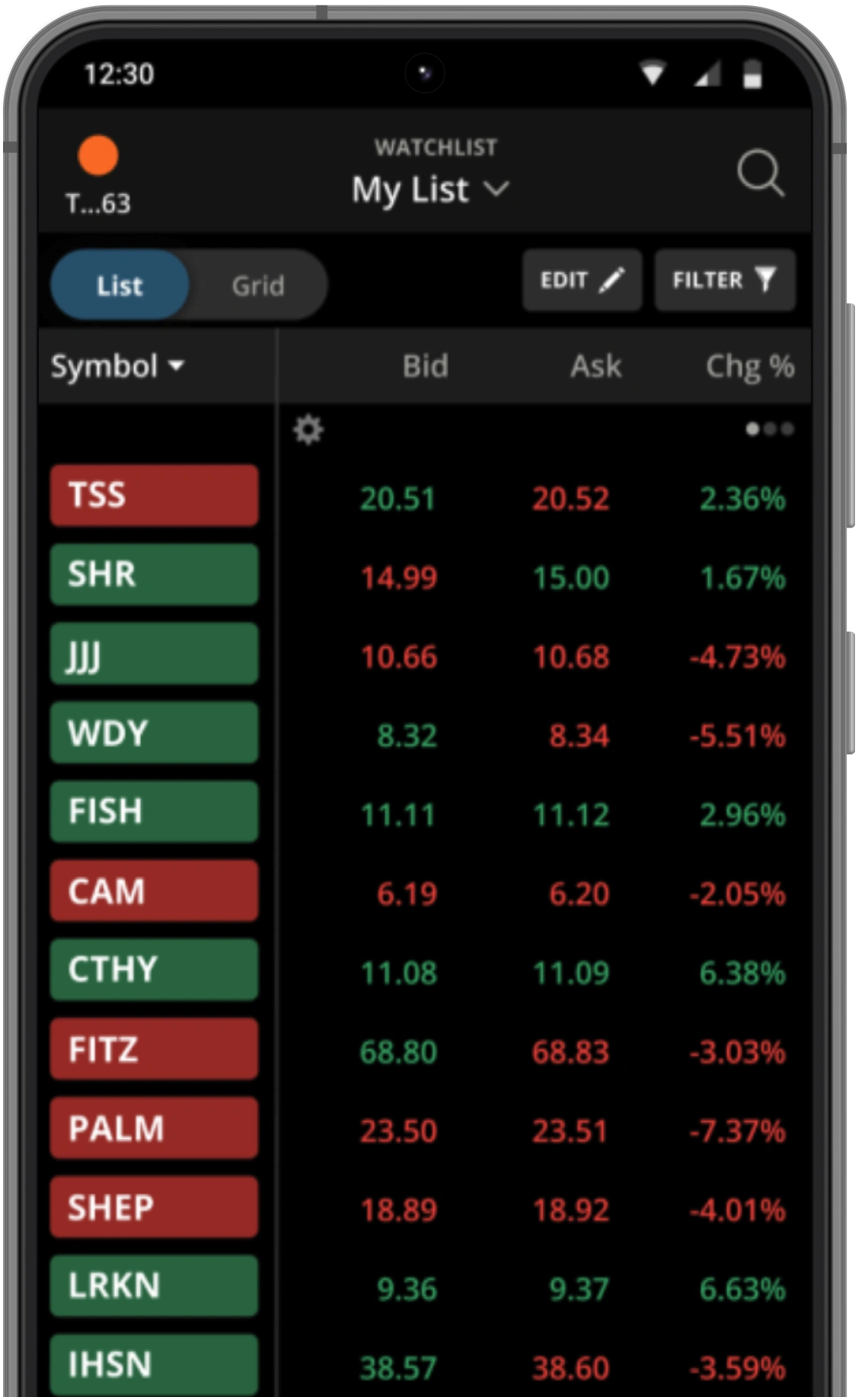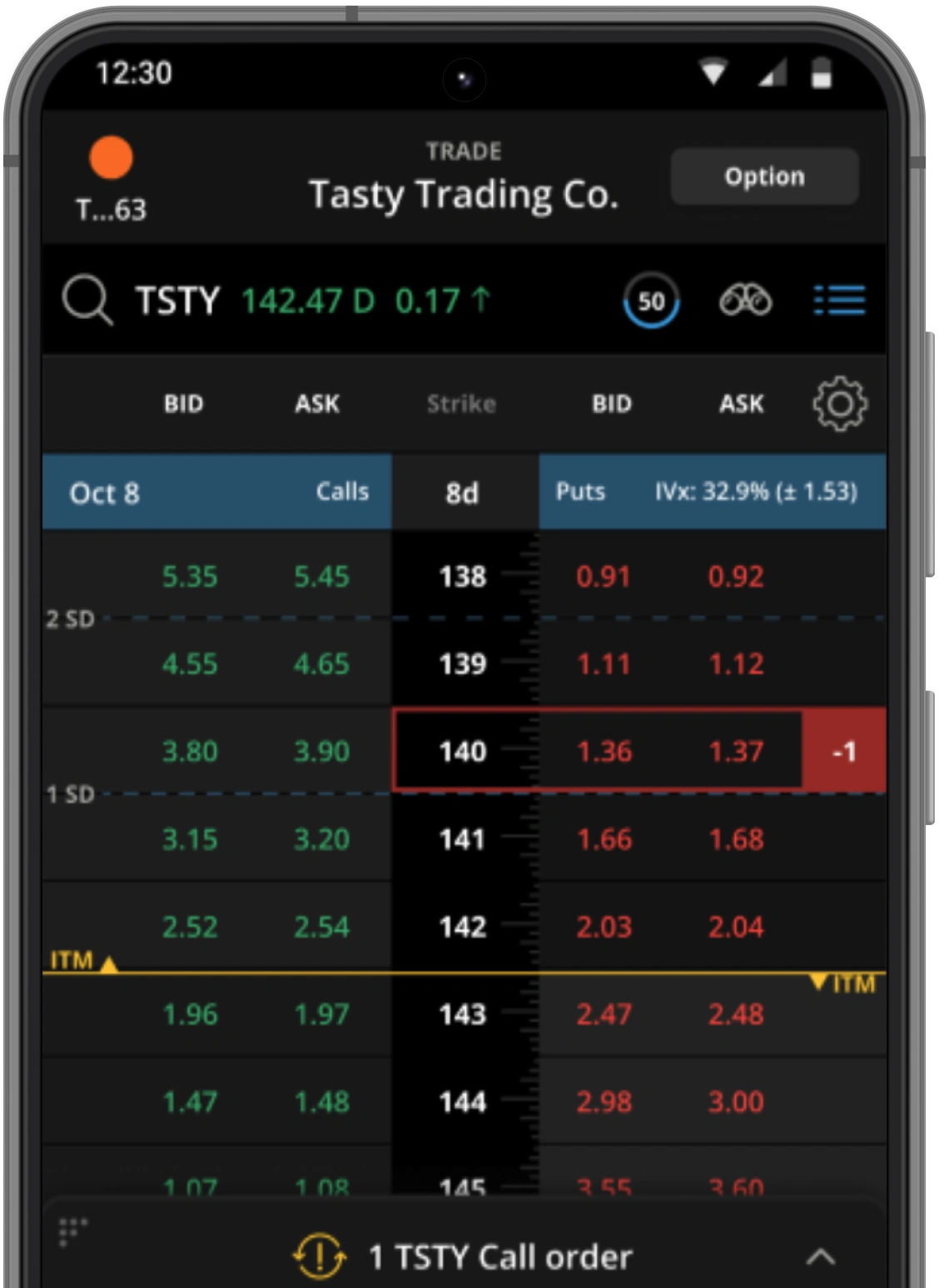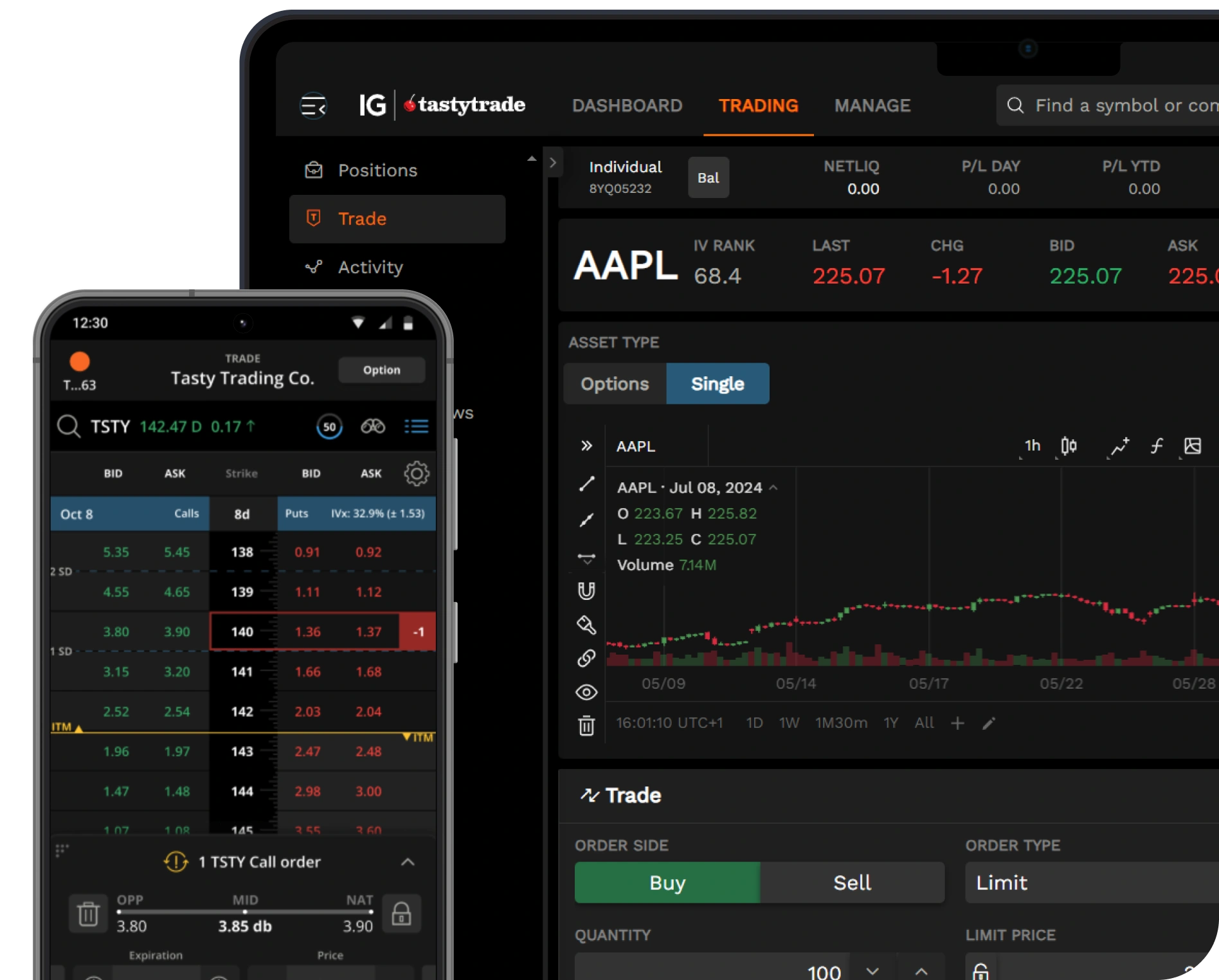SIPC protection up to $500,000
FTSE 250 listed
FCA authorised and regulated
2024
ADVFN International Finance Awards - Best Options Trading Platform
2024
Investopedia - Best Overall Options Trading Platform
2023
ADVFN International Financial Awards - Best Platform for the Active Trader
Trade your way
Find the right account for you to trade options and futures
More than a trading platform
We support you at every stage of your journey
IG Academy
Learn how to trade options contracts and take our thorough introduction into their principles.
Round-the-clock support
Available every hour from 8am Saturday to 10pm Friday (UK). Access live chat and designated support team members for 1-2-1 calls.
Inspirational content
Watch and learn, live and on-demand, courtesy of the team at tastylive.
Low commissions
Capped at $10 a leg for opening trades 5 and $0 commission to close. 6
Go long, short or non-directional
Speculate based on your bullish or bearish stance, or use options strategies for a range-bound, neutral market assumption when you think prices will move sideways.
Innovative platform
Open positions on our award-winning 1 platform with advanced capabilities, including sophisticated risk management tools.

Options and Futures trading, explained

Options trading is taking a position as a buyer or a seller in a contractual agreement to exchange an underlying asset at a specific price by a certain expiration date.
The holder of an options contract has the right, but not the obligation to buy or sell the underlying asset. If they choose to exercise their right, the counterparty is then – through the process of assignment – obligated to fulfil the terms of the contract (ie to sell/buy the underlying to/from the holder).
Futures trading is an agreement to buy or sell an underlying asset at a specified price by a certain expiry date. You’ll exchange the underlying using a futures contract.
Because both parties are obligated to make the exchange, the trade will happen automatically upon expiration at the agreed-upon price if the holder doesn’t do it before the expiry date. Comparatively, options allow for more flexibility as there’s no obligation for the owner to exchange the underlying.
Low commissions 2
From $1.00 per contract to open and no commission charge to close options positions 2
Commissions capped at $10.00 per leg (i.e. one part of a multi-component trade) for equity and ETF options 2
From $0.85 commission per contract to open and close a futures position, each way
How we compare*
| IG | Interactive Brokers | Saxo Bank | Charles Schwab | |
|---|---|---|---|---|
| Fee structure | Simple, uniform commission rate | Commission rates vary depending on account tier | Commission rates vary depending on account tier | Uniform commission rate |
| Open and close commissions | From only $1 to open, $0 to close | Charge to close, no commission to open | Charged per lot - more lots, more commission to pay | Per contract fee - more contracts, more commission to pay |
| Account tiers | Single tier account | Tiered account which affects commission rate | Tiered account which affects commission rate | Single tier account |
| Capped commission | You'll never pay more than $10 per leg | No max commission - costs incurred are unlimited | No max commission - costs incurred are unlimited | No max commission - costs incurred are unlimited |
| Broker assisted trade fees | $0 | Commission $0.95 per option contract, minimum 100 option contracts | N/A | $25 service charge |
| Support | Call Online chat | Call Online chat | Online FAQs | Call |
Trade on an award-winning platform 1
Built by our traders at tastytrade, for today’s traders
- Best Platform for Options trading - ADVFN International Finance Awards 2024
- Available on web and mobile app
- Trade visually with ‘curve mode’ or stick to more traditional lists

Join IG
It takes just 3 simple steps
A few questions
Let us know a bit more about you
Get verified
We can usually verify your identity immediately
Fund and start trading
We accept all major credit cards, Apple Pay and bank transfers


The numbers speak for themselves
0
years’ expertise
0
countries
0
global clients
0
+worldwide markets
FAQs
Everything you need to know about the Tastytrade
tastytrade and tastylive are brainchildren of options traders who wanted to empower ambitious and self-directed traders. The content brand – tastylive – launched in 2011, and the brokerage service – tastytrade – followed in 2017. Both joined IG Group in 2021. Offering options, futures, stocks and more, tastytrade enables your pursuit of financial freedom. Access the award-winning broker’s options and futures products, using fast and reliable software, straight from the My IG dashboard through our streamlined platform. 1 tastylive is a free online financial network with over 100 original shows broadcasting to its team, viewers and listeners – affectionately known as ‘the tastynation’. With 40 hours of live programming each week, there’s something for everyone – inspiration, live trades, education and so much more. This global community has garnered around 27 million YouTube views through its fun and engaging content. 8
We provide our clients access to trade US-listed products through our US options and futures account. To do this, we’ve partnered with the Apex Clearing Corporation in the USA. Apex is a third-party firm that’s regulated by the Securities and Exchange Commission (SEC) – it specialises in providing clearing and other back-office financial services for US-listed options and futures products.
Apex clears and processes US options and futures account transactions, and provides asset custody and settlement services. In essence, Apex deliver the behind-the-scenes services that allow us to offer US-listed options and futures.
Any money or securities you hold in a US options and futures account is held by Apex in the USA in accordance with SEC and FINRA (Financial Industry Regulatory Authority) rules. Apex accounts are covered by the US Securities Investor Protection Company (SIPC), which provides protection for money and assets up to $500,000.
For more details about our relationship with Apex and for relevant market data agreements, see the information on customer agreements.
Your funds and securities held by Apex aren’t subject to Financial Conduct Authority (FCA) client money and asset rules and may not be protected by the UK Financial Services Compensation Scheme (FSCS).
Learn more about what we do with your moneyOptions trading is taking a position as a buyer or a seller in a contractual agreement to exchange an underlying asset at a specific price by a certain expiration date. The holder of an options contract has the right, but not the obligation to buy or sell the underlying asset. Whereas the counterparty is obligated through assignment if the owner exercises their right to buy or sell the underlying.
Options are standardised and you can choose a call or a put to speculate on a financial instrument's price movements. Possible profits and losses don’t depend on direction only, though, as options are non-linear – they’re also affected by factors such as implied volatility (IV), time to expiration and location of the strike price in relation to the underlying price. You can combine calls and puts to employ a variety of strategies across different market environments.
Futures trading is an agreement to buy or sell an underlying asset at a specified price by a certain expiry date. You’ll exchange the underlying using a futures contract.
Because both parties are obligated to make the exchange, the trade will happen automatically upon expiration at the agreed-upon price if the holder doesn’t do it before the expiry date. This is one of the differences between options and futures.
Comparatively, options allow for more flexibility as there’s no obligation for the owner to exchange the underlying. But these contracts are also similar in ways, eg both are standardised and traded on regulated exchanges.
As a retail client, your money and assets are protected in several ways with us. We’re authorised and regulated by the Financial Conduct Authority (FCA), which has strict regulatory requirements that govern precisely what we can do and how we must do it. Here are some of the measures we take to ensure that we protect your money and assets:
- We separate your money and assets from our own resources
- Your money is held in segregated client accounts at regulated banks
- Your assets are held by a custodian in segregated client asset accounts
- Client bank and asset accounts are named accordingly to be easily identifiable as such
- Your money and assets (eg shares) are never merged with our own money or assets
- We don’t use your money and assets in the course of our business activities
It’s vital to understand the risks and complexity of trading in a margin account as it may not be suitable for you. When you use this account type, you’ll typically trade on a leveraged basis, which gives you magnified exposure. To open a position, you’ll only need to pay a certain percentage of the trade’s total worth, ie notional value. However, pure-form options are non-marginable – even when trading them in a margin account.
Leverage enables you to open a much bigger trade at a smaller initial deposit and gives you amplified potential for profit. But it also magnifies your possible losses, and you could lose money rapidly. Any profits made or losses incurred are calculated based on the full value of the trade.
When trading in a margin account, you’ll have more options and futures strategies available to employ, eg selling naked call options, defined-risk options spreads, and buying and selling futures and futures options.
Trading using a margin account carries increased risks compared to a cash account and can result in your losses exceeding your deposits. You can find detailed information about this in our risk disclosure notice.
Trade US-listed options and futures with IG
With low commissions on an award-winning platform 1
Open an account now

